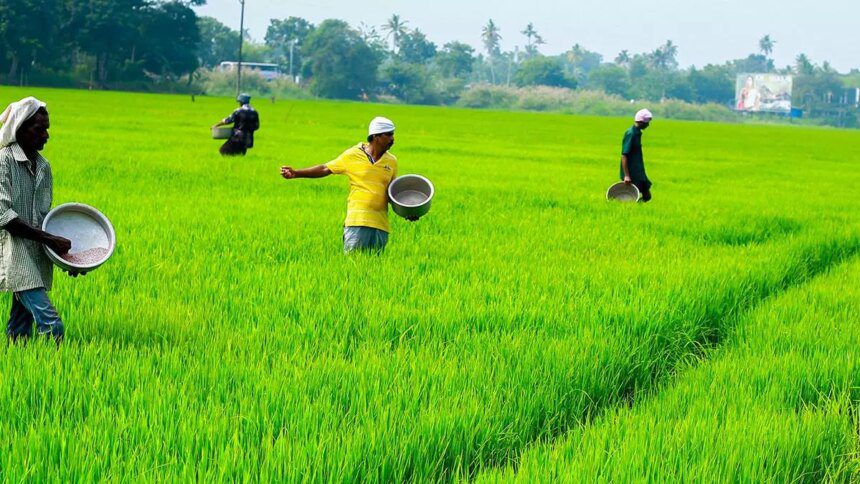The agriculture and commodities sectors have welcomed the Budget as it provides a much-needed impetus to farmers’ welfare, rural economy, women’s development, technological advancement, and crop productivity.
However, some stakeholders believe that the Budget could have allocated more towards schemes like the National Oilseeds Mission, reducing the burden of GST, and encouraging import-substitution.
Deepak Ballani, Director-General of the Indian Sugar and Bio-Energy Manufacturer Association (ISMA), praised the significant measures introduced for the agricultural sector in the 2025 Budget. He welcomed the Dhan Dhanya Krishi Yojana, which is expected to benefit farmers and ensure fair benefits for all participants in the agricultural sector.
Sanjeev Asthana, President of the Solvent Extractors Association, welcomed the focus on the food processing industry, artificial intelligence for the agriculture sector, and the setting up of an additional Gene bank for enhancing plant productivity. He urged the government to allocate an additional ₹5,000 crore for the Oilseed Development Programme.
Suhas Buddhe, Adviser to the Soluble Fertilizer Industry Association (SFIA), appreciated the Budget’s focus on millet production, sustainable farming, and technological advancements like drone integration. However, he felt that key industry concerns, particularly around import substitution for advanced agricultural inputs, were not fully addressed.
Gaurav Kedia, Chairman of the Indian Biogas Association, emphasized the importance of sustainable agriculture and organic farming under the Dhan Dhanya Krishi Yojana. He also highlighted the need to strengthen Farmer Producer Organizations (FPOs) and cooperatives through central boards in partnership with states.
KV Karthik, President of the Indian Pump Manufacturers Association, noted that the increase in the Kisan Credit by ₹2 lakh will boost demand for agricultural pumps, benefiting farmers and the industry. He also welcomed the extension of the Jal Jeevan Mission till 2028, creating sustained business opportunities for water accessibility across the nation.
Jitendra Kumar, MD of the Biotechnology Industry Research Assistance Council (BIRAC), commended the Budget’s focus on crop diversification, post-harvest storage, and credit accessibility for 1.7 crore farmers, aligning with BIRAC’s commitment to supporting agri-biotech innovations.
Balram Singh Yadav, Managing Director of Godrej Agrovet Limited, emphasized the importance of empowering farmers, promoting sustainable production, and building a resilient agri-economy. He highlighted the benefits of the reduction in basic customs duty on a key input material for the fish and aquaculture sector.
Rajavelu NK, CEO-Crop Protection Business of Godrej Agrovet Limited, praised the Mission for Cotton Productivity, integrating science and technology for extra-long staple cotton varieties. He highlighted how this initiative can help farmers boost yields and profits.
Simon Wiebusch, Country Divisional Head of the Crop Science Division of Bayer in India, Bangladesh, and Sri Lanka, commended the Budget’s strategy for enhancing agricultural productivity and sustainability. He emphasized the importance of improving post-harvest storage, irrigation, and credit availability to empower farmers and drive economic growth in rural areas.
Susheel Kumar, Country Head and Managing Director of Syngenta India Pvt Ltd, lauded the Budget’s focus on revitalizing rural India and bridging the urban-rural divide. He emphasized that the Budget presents a transformational roadmap for India’s rural economy through infrastructure, innovation, and self-sufficiency.
Sanjiv Kanwar, Managing Director of Yara South Asia, highlighted the government’s focus on innovation, investment, and sustainability in agriculture, which will lead to a thriving and self-reliant agricultural future for India. He underscored the importance of crop diversification, improved irrigation, and better credit availability for sustainable growth.
KC Ravi, Chief Sustainability Officer at Syngenta India, appreciated the well-structured opportunities for Indian agriculture in the Budget. He noted the practical, holistic, forward-looking approach that aims to strengthen farmers, improve productivity, and drive self-sufficiency.
Ravi Annavarapu, President of FMC India, praised the Budget’s vision to transform the Indian agriculture sector through enhanced digital infrastructure that will democratize access to digital agricultural services and pave the way for precision agriculture.
Ajay S Shriram, Chairman and Senior Managing Director of DCM Shriram Ltd, highlighted the focus on climate change, rural employment, self-sufficiency, irrigation, and modernization in the Budget. He noted that policies like establishing a gene bank can help shorten the research cycle for developing climate-resilient seeds.
Tarun Sawhney, Vice Chairman and Managing Director of Triveni Engineering & Industries Ltd, emphasized the Budget’s focus on inclusive and sustainable growth for the agriculture sector. He praised initiatives like the Jal Jeevan Mission and infrastructure development that will enhance supply chain resilience and support domestic manufacturing.
Anil Kumar SG, Founder and MD of Samunnati, commended the Budget for recognizing agriculture as a cornerstone of India’s growth vision. He highlighted the importance of adopting new technologies and sustainable practices to secure the nation’s food future and strengthen rural economies.
Ayush Gupta, Business Head, India, at KRBL Limited, welcomed the initiatives in the Budget for crop diversification, irrigation, and enhanced credit access, which will benefit 1.7 crore farmers and strengthen India’s agricultural backbone.
Anshul Garg, Director and CEO of Aroma AAT Basmati Rice, praised the PM Dhan Dhanya Krishi Yojana for boosting Basmati production domestically and enhancing the credit line for farmers, which will support financial viability during cultivation season.
Rajesh Aggarwal, Managing Director of Insecticides (India) Ltd, highlighted the importance of raising the loan limit under the modified interest subvention scheme to help farmers invest in better resources and manage expenses efficiently. He also noted the establishment of a Makhana Board in Bihar and the introduction of a Cotton Productivity Mission to support cotton cultivators.
Manoj Arora, Managing Director and Chief Perfumer of Sacheerome, noted that the Budget will directly benefit the fragrance and flavor sector by ensuring a steady supply of high-quality raw materials through advanced farming techniques and sustainable practices.
Saroj Kumar Mahapatra, Executive Director of PRADAN, emphasized the need for crop diversification and sustainable farming practices at the grassroots levels to ensure localized impact.
Sat Kumar Tomer, Founder and CEO of Satyukt Analytics, applauded the National Geospatial Mission announced in the Budget, noting that real-time spatial data can transform precision farming by optimizing water and inputs for sustainable and profitable agriculture.
Renuka Diwan, Co-founder and CEO of BioPrime, highlighted the establishment of large-scale vegetable production clusters near consumption centers to streamline supply chains and ensure fresher produce for consumers.
Vimal Kumar Alawadhi, Managing Director of Best Agrolife Ltd, praised the targeted development of seeds with pest resistance, high yield, and climate resilience to enhance overall productivity.
Anand Ramanathan, partner at Deloitte India, noted that the Budget’s comprehensive focus on agriculture will lead to enhanced productivity and rural livelihoods. He highlighted the importance of import substitution, capacity augmentation for domestic urea manufacturing, and boosting exports through initiatives like marine processing and cotton cultivation.
Pushan Sharma, Director of Research at Crisil Intelligence on Agriculture, emphasized the Budget’s focus on income, inflation, import reduction, and insulation from climate change to address food inflation and promote sustainable agricultural growth.
Shashi Kant Singh, Partner in Agriculture and Food at PwC India, appreciated the continued support for empowering cooperatives, Farmer Producer Organizations (FPOs), and fisheries in the Budget, reinforcing the government’s commitment to inclusive and sustainable growth in the agriculture sector.
Padmanand V, Partner and Agriculture Industry Leader at Grant Thornton Bharat, highlighted the game-changing proposals in the Budget for competitive import substitution in pulses and oilseeds, phased MSP support, and a thrust on fisheries.
Vivek Iyer, Partner at Grant Thornton Bharat, noted that the agricultural reforms in the Budget aim to strengthen supply chains, promote balanced nutrition, and enhance food security to curb long-term food inflation.
Aashish Kasad, National Leader for the Chemicals and Agriculture sector at EY India, underscored the Budget’s policies and financial plans aimed at reaching the objective of Viksit Bharat and promoting agricultural growth.
RG Agarwal, Chairman Emeritus of Dhanuka Agritech Limited, praised the Budget for strengthening the Make in India agriculture sector and boosting farmer spirits. He urged the government to reconsider reducing GST on essential agricultural inputs to 5 percent.
Abhishek Jain, Director of Green Economy and Impact Innovations at the Council on Energy, Environment, and Water (CEEW), highlighted the need to focus on the micronutrient profile of agricultural production to address micronutrient deficiency.
Utham Gowda, Founder and Group CEO of Captain Fresh, emphasized the importance of prioritizing value-driven exports and enhancing value-added products in the marine products sector to drive growth.
Ankur Aggarwal, Chairman of CropLife India and Managing Director of Crystal Crop Protection Ltd., welcomed the government’s vision to prevent rural migration and prioritize women and youth in agriculture initiatives.
Saket Chirania, Co-Founder of Agrizy, highlighted the opportunities for expansion, innovation, and global competitiveness in agriculture resulting from the reforms introduced in the Budget.
Mayur Modi, Co-Founder of MoneyBoxx, noted the Budget’s focus on encouraging farm revenue and its positive impact on the agriculture sector.
Madan Mohan, President of the International Federation of Indigenous Zebu Cattle Of India (IFIZCI), welcomed the increased loan limit under the Modified Interest Subvention Scheme, which will provide financial support to small and marginal farmers engaged in agriculture and allied activities.
Amit Patjoshi, CEO of Palladium India, praised the Finance Minister’s emphasis on agriculture in the Budget, calling it a transformative step towards making India the food basket of the world.
Rohit Mehrotra, Co-founder of Organic Tattva, highlighted the increase in subsidies for food, fertilizer, cooking gas, and infrastructure development to boost agricultural productivity and support farmers’ financial well-being.
Haresh Karamchandani, MD & Group CEO of HyFun Foods, lauded the government’s efforts to push farm exports and reach $80 billion by 2030, aligning with India’s aspirations to be a global food powerhouse.
Ranjith Mukundan, CEO & Co-founder of Stellapps Technologies, saw an opportunity in the Budget for the dairy sector to enhance productivity, quality, and global competitiveness through skilling, technology, and investment.
Anubhav Agarwal, MD and CEO of BN Group, emphasized the critical steps taken in the Budget to boost oilseed production and strengthen India’s edible oil ecosystem through the National Mission for Edible Oilseeds.
Ajay Kakra, Leader of Food and Agriculture at Forvis Mazars in India, commended the Budget for its transformative approach to agriculture, focusing on grassroots implementation and farmer empowerment.
Meghna Mishra, Senior Partner at Karanjawala & Co, highlighted the significant budgetary allocation for irrigation, agricultural infrastructure, and modern farming techniques to promote sustainable farming.
Pradeep Palelli, Co-Founder & CEO of Thanos Technologies, expressed excitement about the funds allocated towards developing agri districts and skilling initiatives for rural communities. He emphasized that this investment will catalyze the adoption of advanced agri-tech solutions like precision farming and AI-driven analytics.
Chirag Sharma, CEO of Drone Destination, noted the alignment of the government’s commitment to agriculture, MSMEs, and women’s empowerment with the potential for drone technology to create impact in agriculture and skill development.
Sachin Jain, Regional CEO, India, at the World Gold Council, highlighted the Budget’s proposals as advantageous for the gold industry, promoting economic growth and increasing disposable incomes.
Praveena Rai, MD & CEO of MCX, welcomed the removal of basic customs duty on metal commodities like copper, lead, and zinc, noting its potential to boost the circular economy and support domestic manufacturing.
Renisha Chainani, Research Head at Augmont, noted the tariff changes in the Budget for gold imports, distinguishing between different forms to address market disruptions. She also highlighted the reduced customs tariffs on gold jewelry items.
MP Ahammed, Chairman of Malabar Group, praised the Budget for offering fiscal impulses to boost consumption, which directly benefits the retail and jewelry sector, promoting expansion and employment generation.










